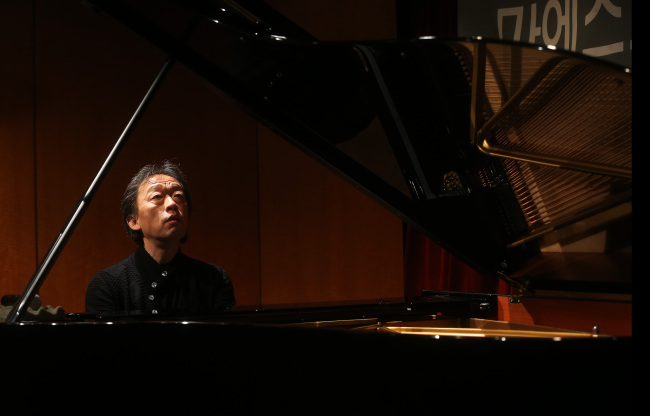Maestro Chung Myung-whun has been known for bringing life to orchestras. Many from Opera Bastille and Radio France to Seoul Philharmonic, have been praised for innovation under his lead, while Berlin Philharmonic, Vienna Philharmonic, London Symphony and other internationally acclaimed orchestras invited him for his powerful but sophisticated conducting over the past three decades.
But on Tuesday, Chung was back to where his love for music started: Piano.
The 60-year-old pianist-turned conductor released a piano solo album, “Myung Whun Chung, Piano” comprised of some of his most familiar and personally attached piano pieces.
Dedicated to his family, especially his two young grandchildren who are in the stage of accepting and loving music the way it is, Chung shows off a more relaxed, wide-open side of his musical world. Leaving behind his fiery relationship with the piano when he was younger ― Chung said that his wife was once jealous of his intimate relationship with the musical instrument ― the piano master made the pieces quieter, deeper and somewhat almost sacred.
“From time to time you feel like you want to show a tighter and more intimate form of music, something you cannot do with an orchestra,” Chung said Tuesday, at a press showcase of his album. The maestro played most of the scores at the cozy Maria Callas Hall in Samseong-dong, southern Seoul, in front of only about a dozen media crew members.
“And when my son (Chung Sun, a producer at ECM, which released “Myung Whun Chung, Piano”) offered the recording I thought it could be a great chance to reflect my life,” he said.
Of the program, Chopin’s “Nocturne in c-sharp minor” is an homage to the legendary violinist Chung Kyung-wha, who is his older sister.
“She is not only an extraordinary violinist but the most passionate musician I have ever seen. Kyung-wha and I used to play the piece rearranged into a violin concerto,” Chung said.
Tchaikovsky’s “Autumn Song” is reminiscent of his sojourn in Russia back in 1974, when he participated in the International Tchaikovsky Competition in Moscow. Throughout the competition, he featured a total of 15 pieces, which led him to nab second place, which paved the way to his career as a musician.
“Russians loved this piece. After playing it, they sent me supportive telegrams, flowers and others that were very encouraging,” he said.
And for his granddaughter Lua, whose name was taken from the Latin term “lune” for the moon, Chung features Debussy’s “Clair de Lune” and Mozart’s Variation on “Ah! Vous dirai-je, Maman (Twinkle, Twinkle Little Star).” Debussy’s portrayal of the pale and beautiful moon became transparent and soft in Chung’s hands while Mozart’s humor got a boost.
And for Schubert’s Impromptu in G-flat major, which Chung played for his eldest son’s wedding, he became meditative. Originally written with a much faster beat, the harp-like long melodic lines took a more laid-back measure. Instead, the atmosphere of reflection and divinity fills between the notes. “This is perhaps the most beautiful musical piece I know and I played it as if I was praying,” Chung said.
The album certainly cannot draw Chung back to the fore as a pianist.
“This was a light-hearted project and I wouldn’t say this was a real pianist’s piano album.” But the recording process was fun, and he is positive about another album.
“Chopin will be good. No pianist could ever go without Chopin,” he said while presenting Ballade No. 1. “That time, it will definitely be a pianist’s piano album,” he said.
By Bae Jisook (
baejisook@heraldcorp.com)








